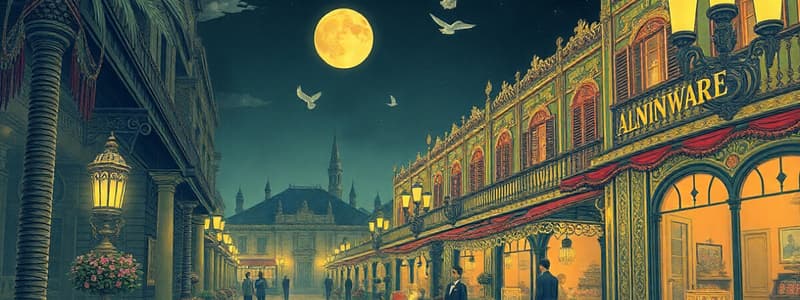Podcast
Questions and Answers
What themes are common in the phantasies experienced by both men and women?
What themes are common in the phantasies experienced by both men and women?
- Triumph in sporting or military arenas (correct)
- Rescue by an idealized figure (correct)
- Achieving mundane daily tasks
- Failure in social situations
How does Norma express hope for the future through her relationship with Joe?
How does Norma express hope for the future through her relationship with Joe?
- By planning elaborate future adventures (correct)
- By seeking validation from others
- By ignoring his needs and focusing on herself
- By reminiscing about her past glories
What does Norma's character primarily struggle to confront?
What does Norma's character primarily struggle to confront?
- Her social standing in society
- Her romantic feelings for Joe
- The passage of time (correct)
- Her financial troubles
What role do Max and Joe play in Norma's life?
What role do Max and Joe play in Norma's life?
What is a key result of Norma's retreat into her idealized past?
What is a key result of Norma's retreat into her idealized past?
How does Joe's character serve as a contrast to Norma's?
How does Joe's character serve as a contrast to Norma's?
What does Norma's desire to fill the pool and open her house signify?
What does Norma's desire to fill the pool and open her house signify?
What does the phrase 'time's winged chariot drawing near' suggest about Norma's mental state?
What does the phrase 'time's winged chariot drawing near' suggest about Norma's mental state?
What do Joe Gillis's and Betty Schaefer's interactions reveal about his current situation?
What do Joe Gillis's and Betty Schaefer's interactions reveal about his current situation?
How does the black and white cinematography affect the mood of the film?
How does the black and white cinematography affect the mood of the film?
What character trait best describes Norma Desmond according to the text?
What character trait best describes Norma Desmond according to the text?
What thematic contrast is established between Joe Gillis and Norma Desmond?
What thematic contrast is established between Joe Gillis and Norma Desmond?
How does the setting of the mansion influence the narrative?
How does the setting of the mansion influence the narrative?
What does the coffin ordered for Norma's pet chimp signify?
What does the coffin ordered for Norma's pet chimp signify?
Why is Joe Gillis described as being on the run at the beginning?
Why is Joe Gillis described as being on the run at the beginning?
What underlying message does the script reader's critique of Joe's work convey?
What underlying message does the script reader's critique of Joe's work convey?
What leads Joe to play the role handed to him in the theater?
What leads Joe to play the role handed to him in the theater?
How does Joe's relationship with Norma evolve throughout the narrative?
How does Joe's relationship with Norma evolve throughout the narrative?
What does Joe feel when he encounters the bizarre figure mentioned in the content?
What does Joe feel when he encounters the bizarre figure mentioned in the content?
What represents the irony in Joe's fantasies about swimming pools?
What represents the irony in Joe's fantasies about swimming pools?
What does Norma use to maintain her fragile sense of power?
What does Norma use to maintain her fragile sense of power?
What characterization does the narrative initially give of Norma Desmond?
What characterization does the narrative initially give of Norma Desmond?
What ultimately causes Joe to lose credibility in the narrative?
What ultimately causes Joe to lose credibility in the narrative?
What does the phrase "he abdicates his tenuous contact with the external world" imply about Joe's state?
What does the phrase "he abdicates his tenuous contact with the external world" imply about Joe's state?
What narrative role does the corpse serve in the film?
What narrative role does the corpse serve in the film?
Which quality of the film is compared to 'Alice-in-Wonderland'?
Which quality of the film is compared to 'Alice-in-Wonderland'?
How should one interpret the experiences of Joe Gillis while watching the film?
How should one interpret the experiences of Joe Gillis while watching the film?
What does Joe Gillis do when he drives towards Sunset Boulevard?
What does Joe Gillis do when he drives towards Sunset Boulevard?
What does Norma Desmond's cigarette holder represent in the film's dream-like context?
What does Norma Desmond's cigarette holder represent in the film's dream-like context?
What does the retreat on Sunset Boulevard symbolize?
What does the retreat on Sunset Boulevard symbolize?
How does Joe Gillis perceive Norma Desmond?
How does Joe Gillis perceive Norma Desmond?
What would happen if Gillis woke up from the dream, according to the discussion?
What would happen if Gillis woke up from the dream, according to the discussion?
Who directed the film mentioned in the content?
Who directed the film mentioned in the content?
Which author wrote 'Learning from Experience'?
Which author wrote 'Learning from Experience'?
What is the main subject of J. Steiner's 'Psychic Retreats'?
What is the main subject of J. Steiner's 'Psychic Retreats'?
What year was 'The Future of Nostalgia' published?
What year was 'The Future of Nostalgia' published?
Which concept is likely explored in H. Weiss's work?
Which concept is likely explored in H. Weiss's work?
In which journal was Kaul's article 'Breaching the Frame: Psychoanalysis and Sunset Boulevard' published?
In which journal was Kaul's article 'Breaching the Frame: Psychoanalysis and Sunset Boulevard' published?
Which film from the content was directed by Alfred Hitchcock?
Which film from the content was directed by Alfred Hitchcock?
What is the main theme explored in the works cited by B.W. Steiner?
What is the main theme explored in the works cited by B.W. Steiner?
Flashcards are hidden until you start studying
Study Notes
Sunset Boulevard: A Psychoanalytic Perspective
- Norma Desmond’s Transformational Experience: Her portrayal of Norma Desmond was deeply impactful, intertwining the boundaries between actor & role.
- Film Critiques Hollywood: It criticizes the Hollywood system's excess by showcasing the clash between Joe Gillis, a struggling screenwriter, and Betty Schaefer, who criticizes his work as unoriginal despite his potential.
- Visual Contrast: City & Mansion: The sharp transition between the urban hustle and the mansion’s eerie quiet underscores the film’s visual potency.
- Black & White Film Stock: Despite the availability of color, the black and white film stock enhances the phantasmatic nature of Norma Desmond's world, highlighting the divergence between reality and fantasy.
- Delusion & Sanity: At first, Norma Desmond appears as a textbook narcissist - controlling and pathetic. Her withdrawal into the deteriorating mansion reflects her struggle with aging.
- Joe Gillis Initially Seen as the Voice of Sanity: His cynicism and pragmatism contrast with Norma's delusion, making him appear grounded.
- Norma's Retreat Into The Past: She is unable to confront the passage of time, seeking refuge in an idealized past, reflected in her dismissal of contemporary actresses except for Greta Garbo.
- Joe’s Relationship with Norma: He represents a hope for future escape from her solitary confinement, evident when she takes him shopping for expensive clothes.
- Norma's Delusional World: This world is brittle, requiring constant upkeep through both Max (preservation) and Joe (fueling).
- Norma’s Fear of Time: The quote by Andrew Marvell, “at my back I always hear, time's winged chariot drawing near”, reflects Norma's terror of time and her desperate attempts to destroy it.
- Joe’s Role in Norma’s Delusion: He is drawn into her delusional world and reinforces her fragile power, allowing her to escape the reality of aging and failure.
- Gillis's Selfish Motives: His cynicism and willingness to exploit Norma are revealed, making him complicit in her delusion.
- Macabre Irony: The foreshadowing of his corpse in the swimming pool, one of his fantasies, highlights the ironic twist of fate.
- Norma's Transformation: She transitions from a caricature to a tragic figure, evoking sympathy for her psychological struggles.
- The Corpse as Narrator: This creates a surreal narrative, inviting the audience to accept a whimsical interpretation of truth.
- The Dream-like Quality of the Film: The film's "Alice-in-Wonderland" like texture encourages a psychoanalytic lens of interpretation, where we perceive events as part of Gillis's dream.
- Sunset Boulevard as an Embodiment of the Dream: Norma becomes a product of Gillis's dreamscape, allowing him to project his anxieties and fears onto her and maintain a sense of sanity.
- The Film's Exploration of Retreat: It examines how both Norma and Joe retreat from reality, seeking solace in their own delusional worlds.
Studying That Suits You
Use AI to generate personalized quizzes and flashcards to suit your learning preferences.




